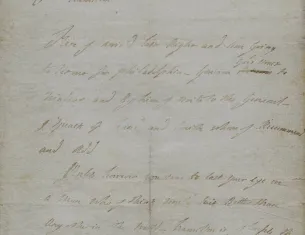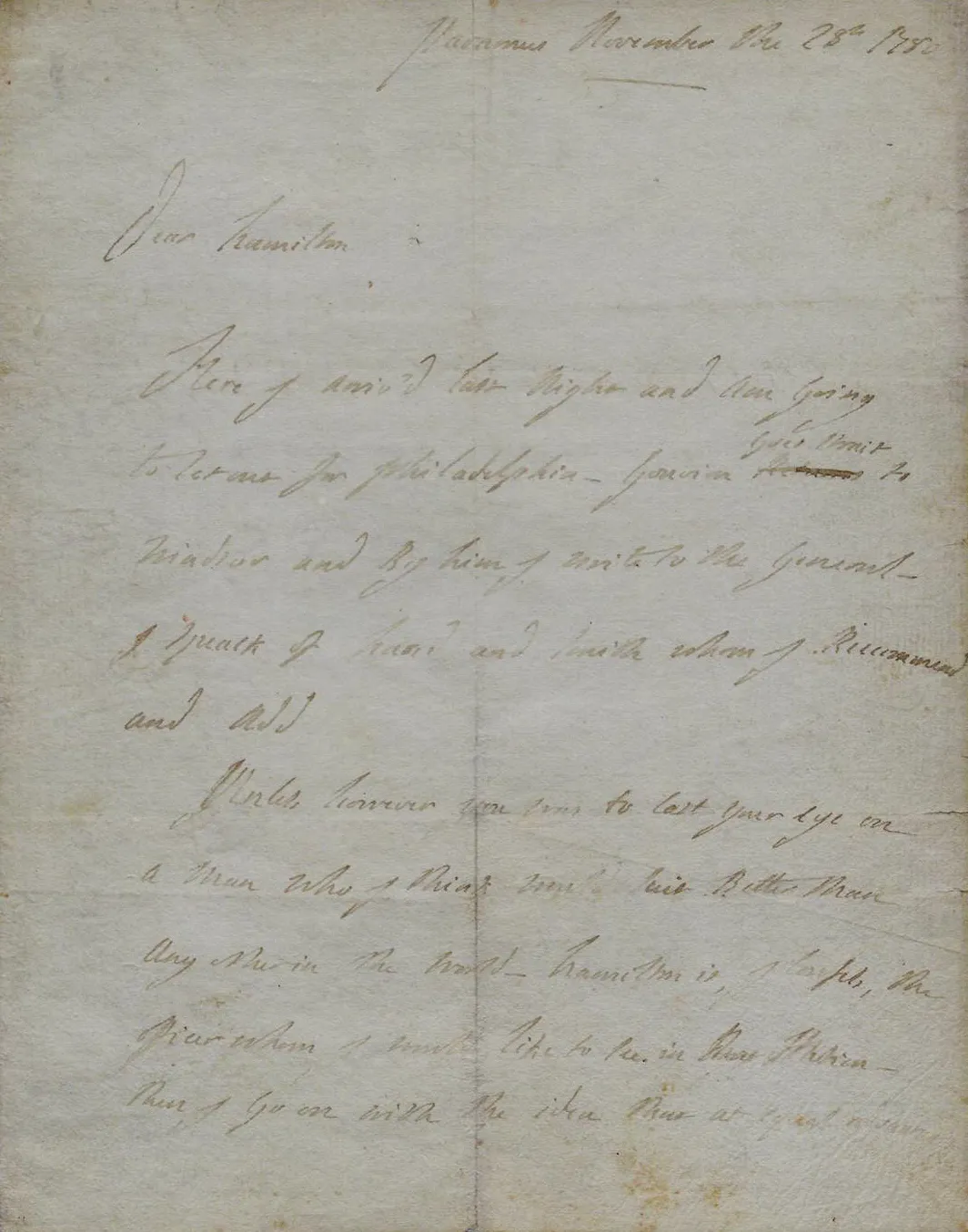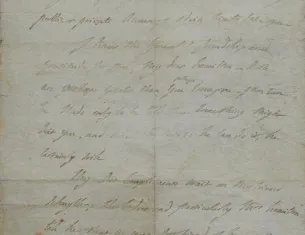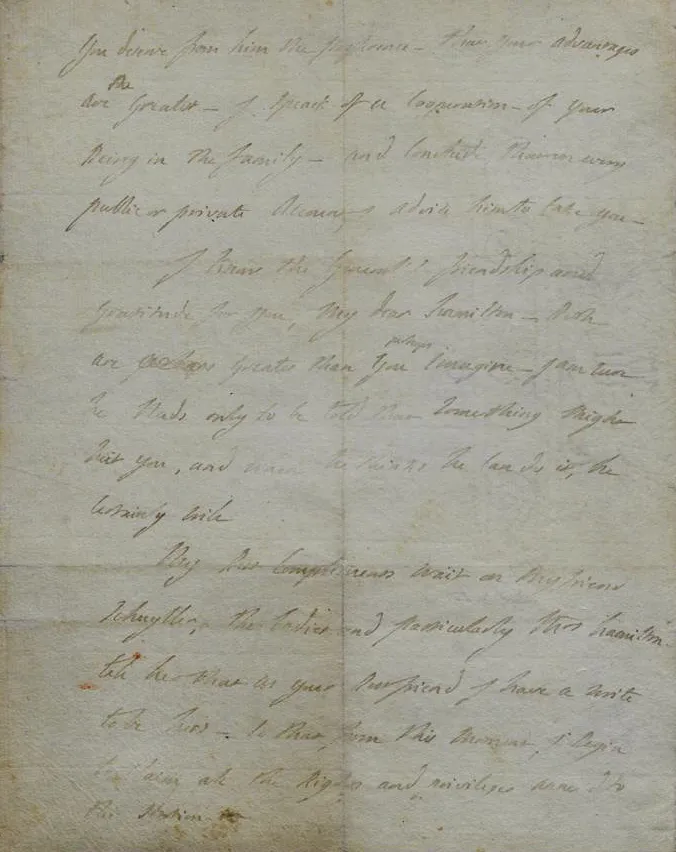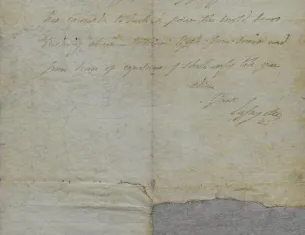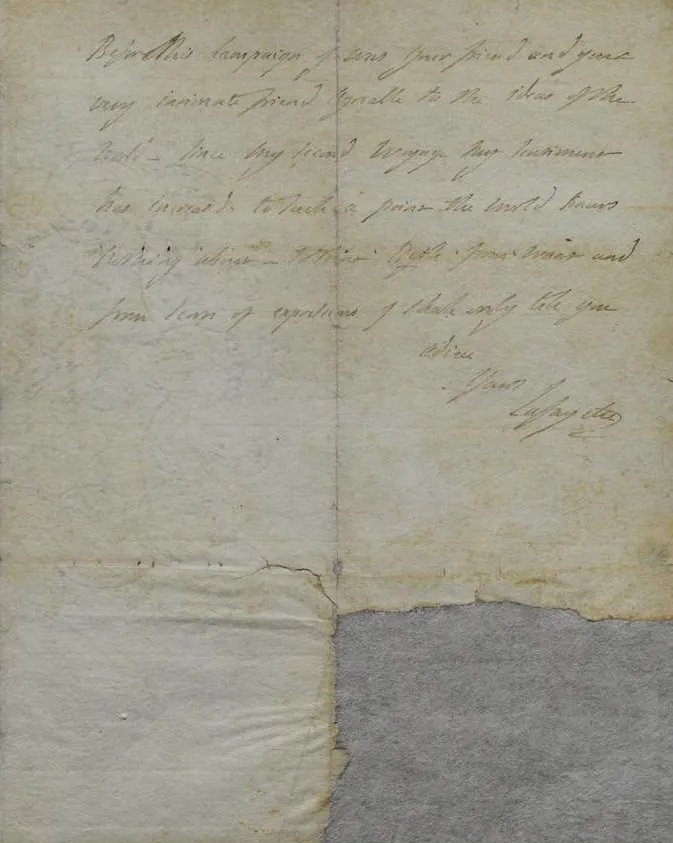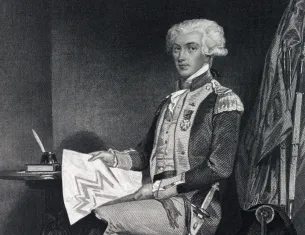Lafayette Recommends Hamilton for Advancement, 1780
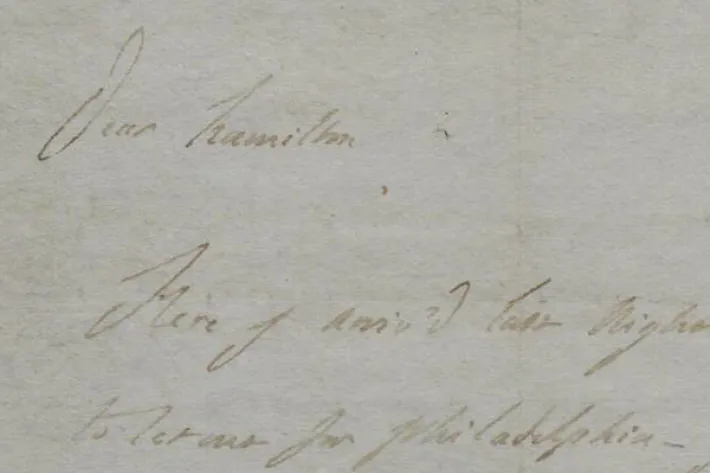
Marquis de Lafayette to Alexander Hamilton, November 28, 1780 (The Gilder Lehrman Institute of American History)
As General Washington’s aide-de-camp Alexander Hamilton had a position of honor and responsibility, but he always craved a field command where he could demonstrate his courage and skill in battle. He repeatedly requested a field command from Washington. Lafayette, attempting to help his friend, sent a letter to Washington recommending Hamilton for advancement. In this letter sent to Hamilton on November 28, 1780, Lafayette describes the letter he sent and describes Hamilton’s abilities. The following summer Hamilton was given a field command and acquitted himself well at the Battle of Yorktown.
A Letter from Marquis de Lafayette to Alexander Hamilton, November 28, 1780
Paramus November the 28th 1780
Dear Hamilton
Here I arriv’d last night and am going to set out for Philadelphia - Gouvion goes strait to Windsor and By him I write to the General - I Speak of hand and Smith whom I Recommend and Add.
Unless, however you was to cast your eye on a man who I think would suit Better than any other in the World - hamilton is, I confess, the officer whom I would like to see in Any Station - Then, I go on with the idea that at equal advantage You deserve from him the preference - that your advantages are the greatest - I Speak of a cooperation - of your being in the family - and conclude that in every public or private Account I advise him to take you -
I know the General’s friendship and gratitude for you, my dear Hamilton - Both are greater than you perhaps imagine - I am sure he needs only to be told that Something Might Suit you, and when he thinks he can do it, he certainly will
My best compliments wait on my friend Schuyler, the ladies and particularly Mrs. Hamilton tell her that as your dear friend I have a write to be hers - to that from this moment I begin to claim all the Rights and privileges annex’d to this Station –
Before this campaign I was your friend and your very intimate friend agreeable to the ideas of the World - Since my Second Voyage my Sentiment has increased, to such a point the world knows Nothing about - to that Both from want and from Scorn of expressions I Shall only tell you
Adieu
Yours
Lafayette
Source: The Marquis de Lafayette to Alexander Hamilton, November 28, 1780, The Gilder Lehrman Institute of American History, GLC03323.
A Letter from Marquis de Lafayette to Alexander Hamilton, November 28, 1780
Paramus November the 28th 1780
Dear Hamilton
Here I arriv’d last night and am going to set out for Philadelphia - Gouvion goes strait to Windsor and By him I write to the General - I Speak of hand and Smith whom I Recommend and Add.
Unless, however you was to cast your eye on a man who I think would suit Better than any other in the World - hamilton is, I confess, the officer whom I would like to see in Any Station - Then, I go on with the idea that at equal advantage You deserve from him the preference - that your advantages are the greatest - I Speak of a cooperation - of your being in the family - and conclude that in every public or private Account I advise him to take you -
I know the General’s friendship and gratitude for you, my dear Hamilton - Both are greater than you perhaps imagine - I am sure he needs only to be told that Something Might Suit you, and when he thinks he can do it, he certainly will
My best compliments wait on my friend Schuyler, the ladies and particularly Mrs. Hamilton tell her that as your dear friend I have a write to be hers - to that from this moment I begin to claim all the Rights and privileges annex’d to this Station –
Before this campaign I was your friend and your very intimate friend agreeable to the ideas of the World - Since my Second Voyage my Sentiment has increased, to such a point the world knows Nothing about - to that Both from want and from Scorn of expressions I Shall only tell you
Adieu
Yours
Lafayette
Source: The Marquis de Lafayette to Alexander Hamilton, November 28, 1780, The Gilder Lehrman Institute of American History, GLC03323.
annex’d (annexed) - added
Background
As General Washington’s aide-de-camp Alexander Hamilton had a position of honor and responsibility, but he always craved a field command where he could demonstrate his courage and skill in battle. He repeatedly requested a field command from Washington. Lafayette, attempting to help his friend, sent a letter to Washington recommending Hamilton for advancement. In this letter sent to Hamilton on November 28, 1780, Lafayette describes the letter he sent and describes Hamilton’s abilities. The following summer Hamilton was given a field command and acquitted himself well at the Battle of Yorktown.
Transcript
A Letter from Marquis de Lafayette to Alexander Hamilton, November 28, 1780
Paramus November the 28th 1780
Dear Hamilton
Here I arriv’d last night and am going to set out for Philadelphia - Gouvion goes strait to Windsor and By him I write to the General - I Speak of hand and Smith whom I Recommend and Add.
Unless, however you was to cast your eye on a man who I think would suit Better than any other in the World - hamilton is, I confess, the officer whom I would like to see in Any Station - Then, I go on with the idea that at equal advantage You deserve from him the preference - that your advantages are the greatest - I Speak of a cooperation - of your being in the family - and conclude that in every public or private Account I advise him to take you -
I know the General’s friendship and gratitude for you, my dear Hamilton - Both are greater than you perhaps imagine - I am sure he needs only to be told that Something Might Suit you, and when he thinks he can do it, he certainly will
My best compliments wait on my friend Schuyler, the ladies and particularly Mrs. Hamilton tell her that as your dear friend I have a write to be hers - to that from this moment I begin to claim all the Rights and privileges annex’d to this Station –
Before this campaign I was your friend and your very intimate friend agreeable to the ideas of the World - Since my Second Voyage my Sentiment has increased, to such a point the world knows Nothing about - to that Both from want and from Scorn of expressions I Shall only tell you
Adieu
Yours
Lafayette
Source: The Marquis de Lafayette to Alexander Hamilton, November 28, 1780, The Gilder Lehrman Institute of American History, GLC03323.
Excerpt
A Letter from Marquis de Lafayette to Alexander Hamilton, November 28, 1780
Paramus November the 28th 1780
Dear Hamilton
Here I arriv’d last night and am going to set out for Philadelphia - Gouvion goes strait to Windsor and By him I write to the General - I Speak of hand and Smith whom I Recommend and Add.
Unless, however you was to cast your eye on a man who I think would suit Better than any other in the World - hamilton is, I confess, the officer whom I would like to see in Any Station - Then, I go on with the idea that at equal advantage You deserve from him the preference - that your advantages are the greatest - I Speak of a cooperation - of your being in the family - and conclude that in every public or private Account I advise him to take you -
I know the General’s friendship and gratitude for you, my dear Hamilton - Both are greater than you perhaps imagine - I am sure he needs only to be told that Something Might Suit you, and when he thinks he can do it, he certainly will
My best compliments wait on my friend Schuyler, the ladies and particularly Mrs. Hamilton tell her that as your dear friend I have a write to be hers - to that from this moment I begin to claim all the Rights and privileges annex’d to this Station –
Before this campaign I was your friend and your very intimate friend agreeable to the ideas of the World - Since my Second Voyage my Sentiment has increased, to such a point the world knows Nothing about - to that Both from want and from Scorn of expressions I Shall only tell you
Adieu
Yours
Lafayette
Source: The Marquis de Lafayette to Alexander Hamilton, November 28, 1780, The Gilder Lehrman Institute of American History, GLC03323.
annex’d (annexed) - added
